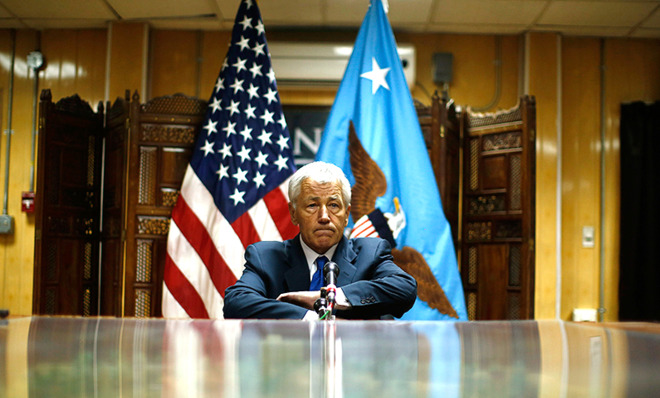Chuck Hagel was a huge mistake
He was the wrong man to lead the Pentagon in a new direction


A free daily email with the biggest news stories of the day – and the best features from TheWeek.com
You are now subscribed
Your newsletter sign-up was successful
"He wasn't up to the job."
That one sentence from an anonymous White House official is the final verdict on Chuck Hagel, who by all appearances is being shoved out of his post as secretary of Defense. It was perhaps his sad destiny all along to leave the administration in the most humiliating way possible, since he joined it in similar fashion, winning confirmation only after he was bludgeoned to near-death by his former Republican colleagues in the Senate.
From beginning to end, it was clear that Hagel was the wrong man at the wrong time to lead the Pentagon, though not for reasons that his critics claim, namely that he is too dovish to lead the world's largest military at a time of enormous instability in the Middle East. Rather, it's that while he served as an embodiment of the Obama administration's foreign policy goals, he was a terrible advocate for them.
The Week
Escape your echo chamber. Get the facts behind the news, plus analysis from multiple perspectives.

Sign up for The Week's Free Newsletters
From our morning news briefing to a weekly Good News Newsletter, get the best of The Week delivered directly to your inbox.
From our morning news briefing to a weekly Good News Newsletter, get the best of The Week delivered directly to your inbox.
In a superficial sense, Hagel ticked a lot of boxes for the administration. He won two Purple Hearts in Vietnam. As the senator from Nebraska, he made his name in debates over foreign policy. He is technically a Republican. But he opposed the Iraq War and generally advocated for a liberal foreign policy. He encouraged engagement with Iran. He was a forceful critic of Israel. He advocated for nuclear disarmament.
He was, in other words, a dove with a national security pedigree, which made him seem like the right choice to lead the Pentagon as the administration drew down from Iraq and Afghanistan and tried to rein in the military's insanely bloated budget.
But the White House miscalculated badly. An outright liberal would have been more palatable to Senate Republicans than Hagel, who had long been written off as an attention-seeking turncoat. Look no further than the treatment he received at the hands of Sen. John McCain (R-Ariz.), who once reportedly considered Hagel a "BFF." At the confirmation hearing, McCain repeatedly savaged Hagel over his opposition to the 2007 Iraq troop surge, which Hagel had previously described as "the most dangerous foreign policy blunder since Vietnam."
That wasn't the only questionable statement or position from Hagel's past that got him into trouble. He had called the powerful Israeli lobby the "Jewish lobby," a phrase that carries the whiff of bigotry. He had opposed sanctions on Iran that Obama strongly supported. He had said the Iranian government was "legitimate." He had endorsed a "unilateral" disarmament of nuclear weapons.
A free daily email with the biggest news stories of the day – and the best features from TheWeek.com
However you feel about any of those positions, the fact is that they were to the left of the White House, which forced Hagel to renounce nearly all of them during his confirmation. He went so far as to say that he wished he could "go back and edit that, like many of the things I've said, I would like to change the words and the meaning."
This gap between Hagel and the White House was crystallized by Hagel's statement during the hearing that the administration's goal was to "contain" Iran, which it wasn't. Hagel backtracked once again, only this time it didn't just seem like he would say anything to get the job, but that he was clueless.
Hagel never recovered from the hearings. His credibility was shot. He has been largely invisible these past two years, his sad plight captured in this one anecdote from a New York Times article in October:
Mr. Hagel has a different problem. A respected former senator, like Mr. Kerry, Mr. Hagel says little in policy meetings and has largely ceded the stage to the chairman of the Joint Chiefs of Staff, Gen. Martin E. Dempsey, who officials said has won the confidence of Mr. Obama with his recommendations of military action against the Islamic State.
Defenders of Mr. Hagel attribute his reticence in meetings to fears that the details will leak into the news media, and say he is more vocal in one-on-one sessions with the president. [The New York Times]
So the guy who was brought in to reform the Defense Department, who was expected to lead America in a new direction after a decade of fruitless war, who was supposed to stand up to the hawks in the military, let the head of the armed forces dictate the terms of the debate within the White House because he was scared of a few leaks?
President Obama, and those who want a saner foreign policy, can do better.
Ryu Spaeth is deputy editor at TheWeek.com. Follow him on Twitter.
-
 The Olympic timekeepers keeping the Games on track
The Olympic timekeepers keeping the Games on trackUnder the Radar Swiss watchmaking giant Omega has been at the finish line of every Olympic Games for nearly 100 years
-
 Will increasing tensions with Iran boil over into war?
Will increasing tensions with Iran boil over into war?Today’s Big Question President Donald Trump has recently been threatening the country
-
 Corruption: The spy sheikh and the president
Corruption: The spy sheikh and the presidentFeature Trump is at the center of another scandal